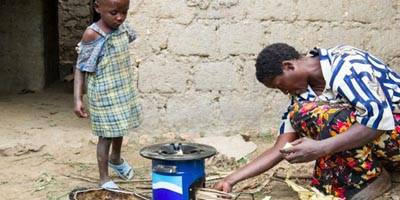About 2.75 billion people lack access to clean cooking solutions. They cook over open fires or use polluting fuels and technologies, posing serious health, environmental and economic problems. Unclean cooking affects much of the global population, but one country particularly impacted is Rwanda.
To know more about the dynamics and impact of dirty cooking, I spoke with some experts in the field:
- Marie-Christelle Ishimwe and Honorine Tumukunde. Rwandan nationals, they are district managers for DelAgua, an environmental service company. DelAgua was founded in the UK in 1985 and operates out of its office in Kigali. It provides clean cooking solutions, in the form of high efficiency cookstoves, to rural villages throughout the country and accompanies the deliveries with an educational service on the issue of unclean cooking and its impact.
- Saroj Rai, Rwanda Energy Sector Leader at the SNV Netherlands Development Organisation. An NGO focused on agriculture, energy, water, and sanitation hygiene, SNV works to fight poverty in 24 countries across Asia, Latin America and Africa.
What does it mean to be clean?
Saroj Rai says that it’s important to be precise about what we mean when we talk about clean cooking and that there also needs to be a distinction between simply ‘improved’ cooking practices and ‘clean’ practices.

“Clean cooking has to be clean enough to have health benefits because the biggest problem of dirty cooking, or cooking in a dirty or smoking kitchen, is health problems,” he told me. “All the other economic and socio-economic problems follow afterwards. So, unless a fuel-efficient stove or an improved cookstove has certain thermal efficiency, it doesn’t bring significant health benefits. The authority on this is the World Health Organization, which defines the global standards for indoor air pollution. In terms of clean cooking, the WHO has defined anything below 40% thermal efficiency as not ‘clean’. Unless a stove reaches this benchmark, it might be improved and cleaner, but it’s not clean enough.”
The effects of unclean cooking
Household air pollution (HAP) is a major cause of death and disability in low- and middle-income countries. HAP is responsible for almost 10% of the mortality, according to the WHO, which estimates that close to 4 million people per year die globally from illness attributable to pollution from inefficient cooking practices. Cooking over open fires or with inefficient cookstoves entails burning fuels such as wood, charcoal and kerosene that release harmful and climate-warming emissions and accelerates deforestation. Moreover, the time-consuming nature of gathering firewood detracts from other activities that people in rural communities could be engaged in, such as attending school or investing time in local business.
Beyond the health and environmental implications, there often needs to be a tangible economic cost to trigger action. Rai said that because there have now been more concrete measurement metrics developed, people are beginning to understand the issue and talk about it more. According to Rai, the annual global health cost of dirty cooking is $1.3 trillion, the annual economic cost is $1.8 trillion, and the average environmental cost is $ 1.2 trillion.
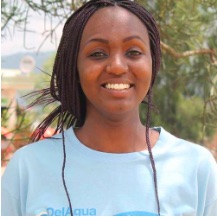
Marie-Christelle Ishimwe grew up in Kigali and joined the DelAgua team shortly after finishing university. She routinely visits rural households to distribute DelAgua’s cookstoves and sees the effects of unclean cooking first-hand. “The walls are dark; the children’s eyes are red because of the smoke. You see the wife cooking, how she’s struggling with the smoke. It’s really sad. When they have our cookstoves, you see the change, immediately you see the change”.
Ishimwe also explained how these effects are poorly understood in rural communities and that a severe lack of knowledge contributes to the problem. “These people that it’s affecting, they don’t even realise it. They were born that way and that’s how their ancestors were doing it. When we tell them that 5000 deaths in Rwanda each year are caused by unclean cooking and smoke, they are shocked. They have all these problems, such as children with asthma and respiratory diseases, but they don’t know why. But it’s because of the smoke.”
The unequal impacts on women and girls
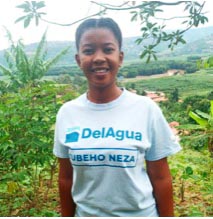
HonorineTumukunde confirmed that women and girls are disproportionality impacted by unclean cooking because entrenched gender norms mean that females tend to carry the burden of household affairs. “In most cases it’s a responsibility of the woman,” she said. “The woman is the one staying at home and cooks around two times a day, exposed to the smoke. The man comes home at night when the smoke has mostly cleared so it doesn’t really affect the man of the household. For women and kids it’s critical, because the kids are mostly at home and often come to help, or they’re around the smoke so it affects them.”
So does a small cookstove, that costs DelAgua only $20, have the power to transform not just the dinner table but propel a shift in the social landscape of a country? I was interested to hear whether my interviewees thought that alleviating the problem of unclean and inefficient cooking methods would affect gender inequality in other walks of life, such as business and employment.
Ishimwe certainly thinks so, saying that “Cooking beans with the old methods takes between three to four hours. But with DelAgua stoves it takes one hour and twenty minutes. So that’s an additional couple of hours where the woman can do other things such as relax or think about other activities or projects.”
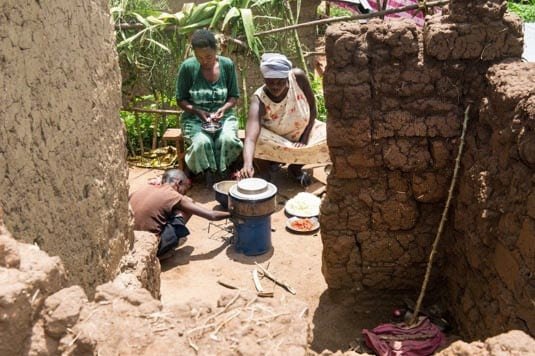
Tumukunde agrees, saying that reduced cooking time (plus any time saved from collecting firewood, which can take up to six hours a day) means that girls are more able to go to school, and women can join in community activities that contribute to their personal and professional development. Interestingly, Tumukunde has seen how the introduction of clean-cooking methods, with the reduced cooking time and improved cleanliness of the stoves, actually incentivises the men to participate more in the kitchen!
As Tumukunde puts it, “If you empower a woman you are able to strengthen the whole family.” Essentially, the basic human right of being able to look after yourself (and not just other people) is kept out of the reach of women and girls if they are unable to access clean cooking facilities. Females make breakfast, spend the morning preparing lunch before cooking it, and in the evenings have to cook dinner. All the while their brothers are at school or their husbands are out at work. Indeed, as Tumukunde asked me, “If I’m always taking care of something else for someone, am I not violating my own rights? To be free, to go and study, to go and chase my dreams, to go and do sport, to go and do things to distract my mind?”
The rural experience
A further insight that my interviews afforded me was the strong difference between the rural and urban experiences with regard to cooking and household activity.
“In the city it’s very easy for clean cooking,” Tumukunde said, “You can do it through electricity. But in the rural areas they have to buy some fuel like firewood. Also, in the city it’s very easy for anyone in the house to cook; a daughter can do it, a man can do it, a dad can do it, a grandma could do it. But in rural areas the women themselves are the only ones who are introduced to cooking.”
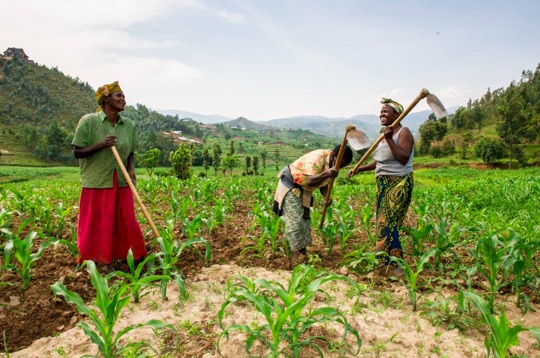
She explained how it’s much easier for the men to cook in cities because there is no need to look for fuel and the cooking is done inside, safely and covered. However, in rural areas, the cooking is sometimes done outside of the house to try to limit the levels of indoor pollution; particularly in the rainy season, cooking a meal therefore becomes a gruelling task.
Ishimwe expanded on the gender dimension from a rural/urban comparison. She told me how, in urban areas, men participate more in household chores. “In the cities, women are not housewives, they go to work. When both people in a couple are working, they must find a balance in the household. In rural areas, male engagement in the house is still really low, mostly because women there are not employed”.
The rate of progress in these urban areas, then, is encouraging. Men are also more educated on gender issues, Ishimwe says. “When you compare the Kigali that we have now, in terms of men’s understanding about equality, and what we had even five years ago, it’s really different.” However, it is clear that in rural areas there is still a lot of work to be done in terms of gender equality and access to clean cooking facilities.
Looking to the Future
Rai says that he is excited to work for Rwanda in the clean-cooking sector because a lot of things are happening. The fact that Rwanda has a relatively stable political system and institutional landscape compared to other countries in sub-Saharan Africa has meant that the country has attracted more international funding. The Energy Sector Management Assistance Program, a partnership between the World Bank, development partners and private non-profit organizations, launched its Clean Cooking Fund in 2019, the first such fund to scale up investments in the clean cooking sector with a target of US$500 million. Of this, $20 million of the World Bank coffers has been dedicated to Rwanda. This project—the largest clean cooking operation in Africa—aims to help more than two million people in Rwanda access clean cooking solutions.
Rai also points out the need to have a developing private sector and said, “You can’t develop a market with only public actors. The private sector is a must in order to develop sustainable energy markets”. He says that the Rwandan government, while being somewhat pro-active on the clean cooking agenda in terms of strategy and commitment to the cause, has many other developmental issues to address too, such as electricity access and infrastructure. The Ministry of Infrastructure in Rwanda has many competing priorities but limited resources and capacity, and so it is difficult to do what needs to be done to achieve the targets they have set themselves in the clean cooking space. An active private sector and the work of NGOs like SNV can help the government to better reach its goals.
“There’s more work to be done,” Tumukunde said. “The key is education and working with society in general. We still have to teach, you still have to understand, you still have to provide different things to the communities to improve their everyday life. This is crucial, particularly until the rural communities have access to electricity like in the cities. If people are educated, they can also see different perspectives on gender equality. Perhaps men will then start doing household tasks without first needing to be asked to do it by a woman”.
Ishimwe told me that her goal is seeing DelAgua get their stoves across the whole country, replace the old stoves distributed more than five years ago, and when that’s accomplished try to distribute two stoves for each house. “It’s still really hard when you have only one cookstove, and we only give one cookstove currently,” she said. “If you want it to be fast, or if you want to cook more than just one dish (such as vegetables and rice), then most people still have to resort to the old methods for half of their meal. Or, when they don’t have enough time or they want their food to stay hot, they use both, which is still a problem.”
It seems clear that a combination of all these expert perspectives is necessary: the private sector, international funding, education, and wider stove distribution capabilities are the key to unlocking the future of clean cooking. Encouragingly, although this issue has traditionally been overlooked, it is certainly gaining more traction on the global agenda. This is particularly in light of the UN General Assembly hosting a high-level meeting on energy, with a focus on household energy and cooking energy, in September, 2021. World leaders came together and discussed concrete ways to contribute to meeting the UN’s Sustainable Development Goal Seven of affordable and clean energy.
This positive development trajectory should not be taken for granted, and is a cause for hope. It seems that a small, twenty-dollar cookstove really does have the power to transform not just the dinner table but a social and developmental landscape, too.
As this article was published, we were pleased to note that Feedspot listed the Upstream Journal as one of the top human rights magazines on the web!

